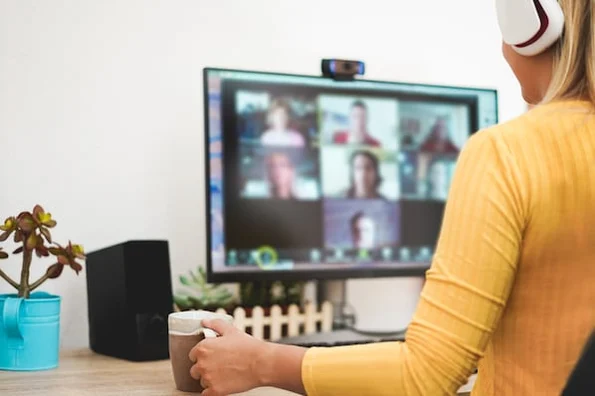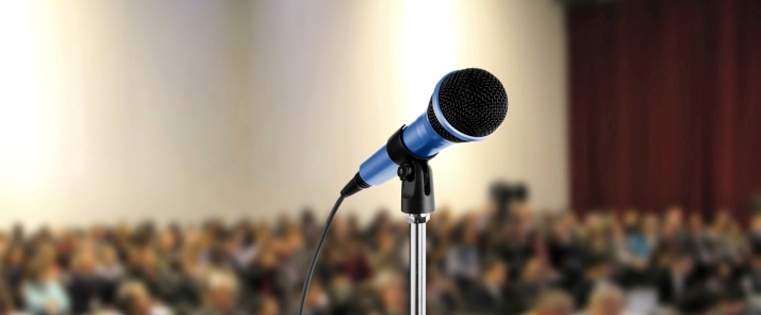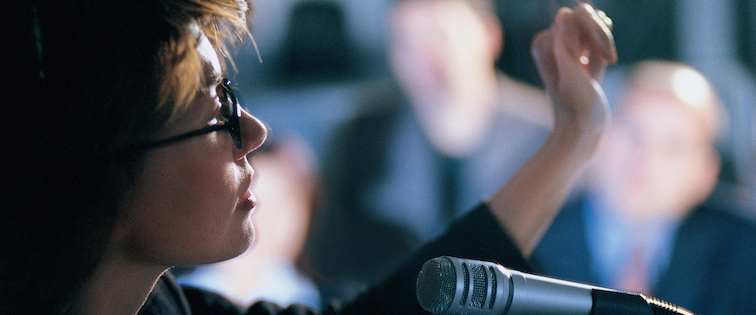In the early days of HubSpot, I wore a lot of different hats -- some of which fit me pretty well.

How did I know this? Well, I started getting more and more offers for speaking engagements. People wanted to hear from me. And when your company wants you to be a public-facing spokesperson for the organization, how can you say no?
I knew that as I continued on this career trajectory of mine, speaking in front of people would become par for the course. One slight hiccup: Public speaking didn’t come naturally to me -- and it showed.
I had done my fair share of speaking in front of crowds, mostly on the leaner side of the packed-house scale. But I’d never bombed. And I wondered: Was the fear of completely tanking holding me back from doing better?
That's what I set out to uncover ...
The Unlikely Solution: Improv
I started researching how to put yourself in a more uncomfortable position to feel better about public speaking. A few blogs suggested getting in front of more crowds in different ways. One blog in particular suggested improv sketch comedy.
Improv? That was for underground comedians -- literally, performed by quick-witted funny people in basement-level theater. At its best, improv was Saturday Night Live, Second City, and Upright Citizens Brigade.
There was not a single frame in any mental image reel where I saw those types of stages and myself together. Speaking in a hotel conference room? Sure. But speaking in an improv comedy room? No way. Too tough. Little did I know, the two were far more similar than I ever could have imagined.
Still, no matter how far-fetched the idea seemed at the time, something inside of me kept shouting over all that anxiety and fear. Some small, dare I say defiant, voice asking, “Why the hell not?”
What Improv Taught Me About Public Speaking
I sat in a small room on the second floor above a dentist’s office. (Your first day isn’t spent in the theater.) Ten strangers: half were learning English as a second language, most were bored and looking for a new challenge, and there were even a couple other business folks looking to get better at public speaking.
Like most first days, you’re taught the complexity of the thing -- this particular thing being improv. You hit the basics, like “yes and…” phrasing, and prepare for the ensuing whirlwind of emotions, education, and excitement to come.
As time went on, I learned a few new things that directly benefited my public speaking ability ...
1. I learned what it meant to bomb, gracefully.
When you’re in front of people and you bomb for the first time, that moment takes an eternity. It turns into this nebulous space where time suddenly has no relevancy. Your instinct is to run offstage, but it's not an option. You're the only one there to steer the ship.
It turns out, bombing isn’t worth its weight in sweat. I bombed early and often in my classes. The more I bombed, the better I felt. I saw where the safety net ended and realized the ground was still right there below me.
In turn, I became more adventurous on stage. I took risks that ended up paying off in laughs I never thought I could get.
2. I learned that timing is everything.
Something we often talked about in class were beats. There were beats to a story. And there were beats to a sketch. Sometimes, a beat was nothing more than a pause. It’s a natural flow in your performance that you try to dial into. After all, life itself is a constant state of improv. So how difficult could it be?
Having written for so long, I felt fairly confident in finding my beat -- until I realized written stories are much different than unscripted performances. When speaking in front of strangers, it’s only human to want to rush through what you have to say. I learned that finding your beat takes practice, like everything else.
When time starts slowing down, you lean into it and use it as a chance to check your pace and plan your next moves.
3. I learned how to stand loud and proud.
Prior to taking classes, I knew my stage presence needed an overhaul. I could stand behind a podium or sit in a chair, no sweat. But improv meant balancing wordplay with action. It meant reacting with instinct and confidence. Your body was as much a force behind the comedic sell as any punchline you could set up.
Some of the first nods to better public speaking you’ll hear are to move around the stage and use gestures. This is incredibly helpful, but the execution is what matters most. And through improv, I learned how to sell my emotions and create excitement without uttering a single word.
Your body is a stage presence unto itself. Improv taught me the power of living in my own skin and using it to its full potential.
Improv in the Workplace
What you learn from improv manifests into your daily habits. Whether you’re in a meeting or at a conference, you bake in pauses when you’re talking. You breathe and take your time. You understand how powerful or distracting your movements can be. You stop pacing. You use your hands and facial expressions for impact, not as a crutch.
Most of all you feel more confident. Confident in yourself to accomplish whatever you set out to -- in work or in life. Your attitude and nerves start at a higher threshold.
If you’re an idealist like myself, you feel public speaking is the biggest gift someone can give you. It’s someone voluntarily giving their time to you and in turn you entrust that they’ll deliver something of value. Making good on that promise is incredibly gratifying.
When I think of public speaking, there’s no better place than our annual INBOUND event. Every time I speak at INBOUND, my heart races they way it did during my very first improv class. But that one speaking engagement affords me follow-up conversations throughout the rest of the year. It's worth it.
So listen to that voice -- no matter how small -- telling you to go for it. It might just change your life. I know it changed mine.
Want to speak at this year's INBOUND event? Apply here (Speaker applications are open now until February 22, 2019).




![How to Memorize a Speech Using Visualization Techniques [Infographic]](https://blog.hubspot.com/hubfs/00-Blog_Thinkstock_Images/giving-a-speech.jpg)


![A Helpful Guide of Public Speaking Tips [Infographic]](https://blog.hubspot.com/hs-fs/hub/53/file-2668164384-jpeg/public-speaking.jpeg)

